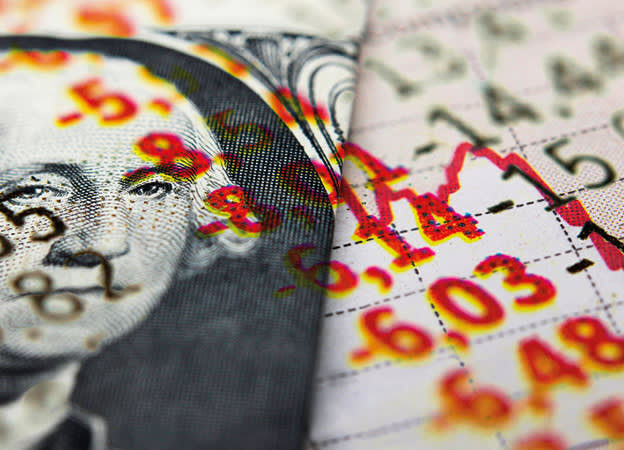
Persistent core inflation, tight labour markets, a central bank with its foot on the brake, dull growth, recession around the corner, hapless politicians facing an election battle next year, a distorted stock market – it’s not the ideal investing backdrop and I’m not talking about the UK, I’m referring to the US.
All of these ailments apply as much across the pond as they do in Britain, and they are a good fit for other developed economies too. The UK is not alone in being weighed down by economic and market troubles.
But the comparison with the US peters out when we dig a little deeper. US GDP growth has been stronger than expected so far this year running at around 2 per cent annualised. However, stock market performance is probably the biggest thing that sets the nation apart from the UK right now. The macro picture might be similar but thanks to the unleashing of the age of AI, the US market has enjoyed a strong rally, with the S&P 500 up 20 per cent in the past eight months. Companies at the heart of the AI story such as Microsoft and chip maker Nvidia have seen their share prices surge, with excitement over the latter’s forecast that sales would hit $11bn in the quarter to the end of July – double what analysts had pencilled in – helping to carry it straight into the $1tn company club. Meanwhile, Apple has been demonstrating all over again its ability to innovate, and deliver durable, if lower, revenue streams. It too has hit a new milestone valuation, of $3tn, up from $2tn earlier this year.
These companies, along with Meta, Alphabet and Amazon, form the engine that is pushing the S&P ever higher. The six of them have contributed close to 90 per cent of the S&P 500’s gains in the year to date. It seems tech stocks can, after all, climb in the face of a hostile rate environment.
But behind the roaring success of select US blue-chips, and many others who deliver outstanding performance year after year (Bearbull profiles a US company on pages 60-61 that is so brilliant at what it does Warren Buffett says he will never sell it), not every company has been performing well in the shadow of inflation and rising interest rates. In the lower echelons of the market – where Russell 2000 companies share much in common with Aim constituents, such as higher levels of debt, weaker balance sheets, tighter margins, high sensitivity to GDP growth given their greater exposure to the domestic economy – performance has been dull in comparison, particularly following the US banking crisis and growing worries about the state of real estate.
Yet, recently, investors’ attention has been turning to small caps – driving the Russell 2000 up by 8 per cent last month – drawn in by enticing valuations, fears over banks receding, a seemingly resilient economy and an end in sight for rate hikes. Goldman Sachs thinks the index could rise by around 14 per cent over the next 12 months, given the low price-to-book valuation of that market. Developments such as reshoring of some manufacturing should be good for US domestic companies. But the broker is more optimistic than others, and it admits that recession could turn sentiment.
That – recession – is the big cloud over the second half of this year. As in the UKm the drag from higher rates hasn’t yet been fully felt and most analysts and economists think a downturn, albeit a shallow one, is more likely now than not as consumers finally rein in spending, savings pots are exhausted and the Fed delivers two more rate hikes. Annualised growth is expected to fall to around 1 per cent by the end of the year. Pantheon Macroeconomics even thinks two hikes might prove unnecessary as significant downward shifts in payroll growth, core inflation, consumer spending and capex, and the collapse in lending by regional banks, combine to create a sustained period of slow growth.
In this environment, small companies could suffer setbacks. Meanwhile, the narrowness of the bull market and high earnings multiples will leave many investors worried about the sustainability of the S&P rally, and possible reversals in some of those premium valuations. Amazon’s experience last year will have served as a reminder that US companies can lose $1tn in value as easily as they can put it on. Establishing a broad-based bull market with legs is therefore contingent on a full return to a more benign economic climate.






